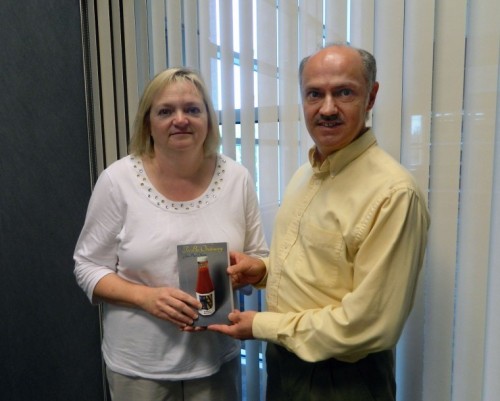
Terrebonne hosting fundraising tournament
May 29, 2012
Cecile Brou Mongrue
May 31, 2012The book publishing industry has seen a revolution in the past few years.
As online book sales and e-books grow in popularity with readers, many authors have taken note of the benefits and decided to publish their own books. Keeping all royalties and having full control is an attractive deal for many, but self-publishing has its own set of costs and requires self-discipline.
Traditional publishing requires an author to send query letters to publishing agents. Only able to include a brief description of the book, many authors get passed over simply because of timing or personal preferences.
The query process can take years, and with limited shelf space at the bookstores, the book may only have a short shelf life. Using a self-publishing company over the Internet, authors can have their work available for purchase in as little as a few minutes.
Houma author Jon Paul Olivier avoided the timely query process when he self-published his book, “To Be Ordinary.” A print-on-demand option allows him to produce as many books as he chooses without having to keep a large inventory. “I have full control of the book that comes out, and it can stay in print as long as I want it to,” Olivier says.
However, full control means the author will have to market and distribute the book himself. Thibodaux author Damon Stentz says this requires expenses such as travel, book printing and conference fees.
Without the traditional book advance from a publishing company, Stentz says these costs come directly out of the author’s pocket. He chose to advertise his book, “The Kraken Slayer,” on the social media site Facebook. “You can spend as much or as little as you want and reach a lot of people worldwide,” he says. “I spent a lot less money, and I saw the results of my ads first hand.”
Although self-publishing gives many more authors the opportunity to publish a book, they still must have a good product. Author of “The Green Bayou Novels” book series, Rhonda Dennis, of Patterson, recommends having a beta reader look over the book for things like spelling, grammar, characterization and continuity before publishing.
“If your beta readers aren’t feeling it, then it’s likely that your audience won’t either,” Dennis says. “Once a reader has taken a chance on your book and they find themselves unimpressed, you can pretty much bet they won’t be back for anything else you publish.”
Because self-publishing is relatively new to the book industry, authors agree that it is still a learning process. They recommend talking with other authors to share experiences and find out what has worked for them.
“Attending writers’ conferences is an excellent source of information on the publishing industry, as well as a chance to network with other writers,” Olivier says. “We have an excellent one right here in Houma every spring called the Jubilee Jambalaya Writers’ Conference.”
Jon Paul Olivier used Vezin Publishing to release his book “To Be Ordinary.”
Damon Stentz used Xlibris Corp to publish his book “The Kraken Slayer.”
Rhonda Dennis used CreateSpace to publish her book “Déjà Vu,” the third of Dennis’ “The Green Bayou Novels” series.






